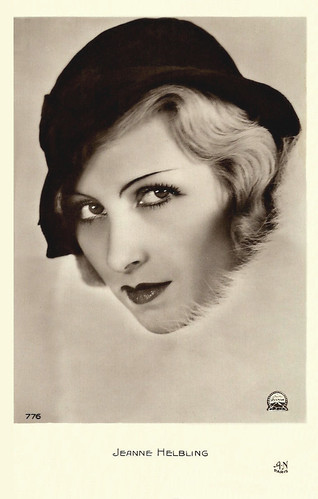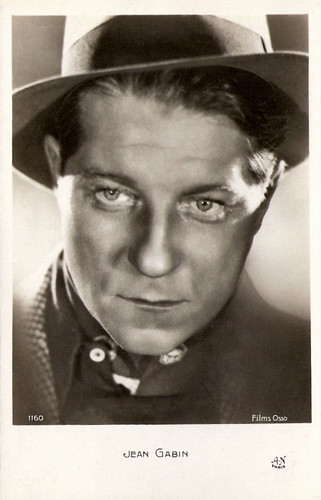From the 1910s till after the Second World War, A.N. or A. Noyer was a large French photo studio and postcard publisher. A.N. produced the beautiful series Les Vedettes de Cinema with ca. 1300 star postcards.
![Stacia Napierkowska]()
Stacia Napierkowska. French postcard by A.N., Paris, in the series Les Vedettes de Cinéma, no. 50. Photo: Sobol.
![Raquel Meller]()
Raquel Meller. French postcard by A.N., Paris, in the series Les Vedettes de Cinéma, no. 51. Sent by mail in 1925. Photo: Sobol.
![Charles de Rochefort]()
Charles de Rochefort. French postcard by A.N., Paris, in the series Les Vedettes de Cinéma, no. 77. Photo: Paramount Film.
![Jean Angelo]()
Jean Angelo. French postcard by A.N., Paris, in the series Les Vedettes de Cinéma, no. 162. Photo: Sartony.
![Pierre Batcheff]()
French postcard by A.N. Paris, in the series Les Vedettes de Cinéma, no. 251. Photo: Production Natan. Publicity still of Pierre Batcheff in Education de prince (Henri Diamant-Berger, 1927). Collection: Didier Hanson.
A.N. or A. Noyer stood for Armand Noyer, and not for Alfred Noyer, as many sources write. He was a well known French photographer in the early 20th Century. His company was located at the Boulevard de Strasbourg in Paris.
In the early 1910s, Noyer started to make postcards. Many of his early cards were photo reproductions of drawn, painted, or sculpted artworks printed in halftone lithography. Noyer was a member of the Salon de Paris and photographed paintings for the Salon and other institutions, which he also used for the production of his art cards.
Armand Noyer’s boldly hand colored seaside figures became his most recognized style. Many of his photos from this time were heavily toned in blue or sepia. Noyer also produced illustrated photo cards of the First World War, many with heavy patriotic or allegorical themes.
![Colette]()
The novelist and performer Colette. French postcard by A.N. Paris, no. 22. Photo: Henri Manuel.
![Georges Carpentier]()
French boxer and war hero Georges Carpentier. French postcard by A.N., Paris. Collection: Didier Hanson.
![Georges Carpentier]()
Georges Carpentier. French postcard by A.N., Paris. Collection: Didier Hanson.
![Miss Europe candidates 1930: the Misses Russia, Austria, and Holland]()
Miss Europe candidates 1930: the Misses Russia, Austria, and Holland. French postcard by A.N., Paris, no. 24. Left Irene Wentzel (aka Irene Wentzell aka Irina Veisel) was Miss Russia in Paris in 1930, elected by Russian immigrants, so she joined the 1930 Miss Europe pageant in Paris. Centre Ingeborg von Grinberger aka Grienberger was Miss Austria 1930, so she also joined the Miss Europe contest. Just like in 1929, the Austrian daily Das neue Wiener Tagblatt had organised the pageant. She originally came from the Austrian province of Steiermark. Most right is Rie van der Rest, the 1930 Miss Holland.
![Miss Europe 1930 candidate: Dorit Nitykowski.]()
Miss Germany 1930: Dorit Nitykowski. French postcard by A.N., Paris, no. 5. Dorit Nitykowski, born 1911 in Berlin, was crowned Miss Germany in 1930 at the Berlin Kaiserhof. She could join the 1930 Miss Europe contest in Paris. Winner that year was Miss Greece: Aliki Diplarakou. Nitykowski also participated in the 1930 Miss Universe contest in Rio de Janeiro. She had to give back her title of Miss Germany, as she married the star pilot Rudolf Cramer von Clausbruch before her one-year existence of Miss Germany had ended.
By the 1920s Armand Noyer began producing cards of children and women, many of which were nudes or risque images. Some sites call them 'boudoir cards', a popular genre since the Belle Epoque.
Noyer also published a widely distributed series of sepia-toned portrait postcards of boxer, war hero and incidental film actor Georges Carpentier, which all contain his signature. The series was produced by A.N. in the lead-up to Carpentier’s legendary fight in 1921 with champ Jack Dempsey. This fight for the world's heavyweight crown became one of the highlights of the Roaring Twenties.
Another example are the many postcards of Miss Europe contestants published by A.N. during the late 1920s and early 1930s.
We're of course especially interested in A.N. because it produced the exquisite series Les Vedettes de Cinema with sepia film star postcards. When the series stopped, A.N. continued to publish film star postcards. The numbering on the cards was continued.
Note that while many postcards carry his distinctive logo or his name, others are just marked A.N.
When and why A.N. stopped publishing postcards is unclear. If somebody has more information to share, please contact us.
![Charles Boyer]()
Charles Boyer. French postcard by A.N., Paris, no. 643. Photo: Metro Goldwyn Mayer.
![Lily Damita]()
Lily Damita. French postcard by A.N., Paris, no. 647. Photo: Metro-Goldwyn-Mayer.
![Marie Bell]()
Marie Bell. French postcard by A.N., Paris, no. 733. Photo: Paramount.
![Jeanne Helbling]()
Jeanne Helbling. French postcard by A.N., Paris, no. 776. Photo: Paramount.
![Pauley]()
Pauley. French postcard by A.N., Paris, no. 1062. Photo: Paramount.
![Jean Gabin]()
Jean Gabin. French postcard by A.N., Paris, no. 1160. Photo: Films Osso.
![Gérard Philipe]()
Gérard Philipe. French postcard by A.N., Paris, no. 1261. Photo: Raymond Voinquel.
This was the seventh post in a series on film star postcard publishers. Next week: Neue Photographische Gesellschaft (NPG). For earlier posts, see the links at right under the caption 'The Publishers'.
Sources: Metropolitan Postcard Club of New York City, Cinema Players Postal Antiquities, Georges Carpentier, The Idol of France, Helmut Schmidt (Boudoir Cards) and WikiBooks (French).

Stacia Napierkowska. French postcard by A.N., Paris, in the series Les Vedettes de Cinéma, no. 50. Photo: Sobol.

Raquel Meller. French postcard by A.N., Paris, in the series Les Vedettes de Cinéma, no. 51. Sent by mail in 1925. Photo: Sobol.

Charles de Rochefort. French postcard by A.N., Paris, in the series Les Vedettes de Cinéma, no. 77. Photo: Paramount Film.

Jean Angelo. French postcard by A.N., Paris, in the series Les Vedettes de Cinéma, no. 162. Photo: Sartony.

French postcard by A.N. Paris, in the series Les Vedettes de Cinéma, no. 251. Photo: Production Natan. Publicity still of Pierre Batcheff in Education de prince (Henri Diamant-Berger, 1927). Collection: Didier Hanson.
Armand Noyer
A.N. or A. Noyer stood for Armand Noyer, and not for Alfred Noyer, as many sources write. He was a well known French photographer in the early 20th Century. His company was located at the Boulevard de Strasbourg in Paris.
In the early 1910s, Noyer started to make postcards. Many of his early cards were photo reproductions of drawn, painted, or sculpted artworks printed in halftone lithography. Noyer was a member of the Salon de Paris and photographed paintings for the Salon and other institutions, which he also used for the production of his art cards.
Armand Noyer’s boldly hand colored seaside figures became his most recognized style. Many of his photos from this time were heavily toned in blue or sepia. Noyer also produced illustrated photo cards of the First World War, many with heavy patriotic or allegorical themes.

The novelist and performer Colette. French postcard by A.N. Paris, no. 22. Photo: Henri Manuel.

French boxer and war hero Georges Carpentier. French postcard by A.N., Paris. Collection: Didier Hanson.

Georges Carpentier. French postcard by A.N., Paris. Collection: Didier Hanson.

Miss Europe candidates 1930: the Misses Russia, Austria, and Holland. French postcard by A.N., Paris, no. 24. Left Irene Wentzel (aka Irene Wentzell aka Irina Veisel) was Miss Russia in Paris in 1930, elected by Russian immigrants, so she joined the 1930 Miss Europe pageant in Paris. Centre Ingeborg von Grinberger aka Grienberger was Miss Austria 1930, so she also joined the Miss Europe contest. Just like in 1929, the Austrian daily Das neue Wiener Tagblatt had organised the pageant. She originally came from the Austrian province of Steiermark. Most right is Rie van der Rest, the 1930 Miss Holland.

Miss Germany 1930: Dorit Nitykowski. French postcard by A.N., Paris, no. 5. Dorit Nitykowski, born 1911 in Berlin, was crowned Miss Germany in 1930 at the Berlin Kaiserhof. She could join the 1930 Miss Europe contest in Paris. Winner that year was Miss Greece: Aliki Diplarakou. Nitykowski also participated in the 1930 Miss Universe contest in Rio de Janeiro. She had to give back her title of Miss Germany, as she married the star pilot Rudolf Cramer von Clausbruch before her one-year existence of Miss Germany had ended.
Boudoir Cards
By the 1920s Armand Noyer began producing cards of children and women, many of which were nudes or risque images. Some sites call them 'boudoir cards', a popular genre since the Belle Epoque.
Noyer also published a widely distributed series of sepia-toned portrait postcards of boxer, war hero and incidental film actor Georges Carpentier, which all contain his signature. The series was produced by A.N. in the lead-up to Carpentier’s legendary fight in 1921 with champ Jack Dempsey. This fight for the world's heavyweight crown became one of the highlights of the Roaring Twenties.
Another example are the many postcards of Miss Europe contestants published by A.N. during the late 1920s and early 1930s.
We're of course especially interested in A.N. because it produced the exquisite series Les Vedettes de Cinema with sepia film star postcards. When the series stopped, A.N. continued to publish film star postcards. The numbering on the cards was continued.
Note that while many postcards carry his distinctive logo or his name, others are just marked A.N.
When and why A.N. stopped publishing postcards is unclear. If somebody has more information to share, please contact us.

Charles Boyer. French postcard by A.N., Paris, no. 643. Photo: Metro Goldwyn Mayer.

Lily Damita. French postcard by A.N., Paris, no. 647. Photo: Metro-Goldwyn-Mayer.

Marie Bell. French postcard by A.N., Paris, no. 733. Photo: Paramount.

Jeanne Helbling. French postcard by A.N., Paris, no. 776. Photo: Paramount.

Pauley. French postcard by A.N., Paris, no. 1062. Photo: Paramount.

Jean Gabin. French postcard by A.N., Paris, no. 1160. Photo: Films Osso.

Gérard Philipe. French postcard by A.N., Paris, no. 1261. Photo: Raymond Voinquel.
This was the seventh post in a series on film star postcard publishers. Next week: Neue Photographische Gesellschaft (NPG). For earlier posts, see the links at right under the caption 'The Publishers'.
Sources: Metropolitan Postcard Club of New York City, Cinema Players Postal Antiquities, Georges Carpentier, The Idol of France, Helmut Schmidt (Boudoir Cards) and WikiBooks (French).